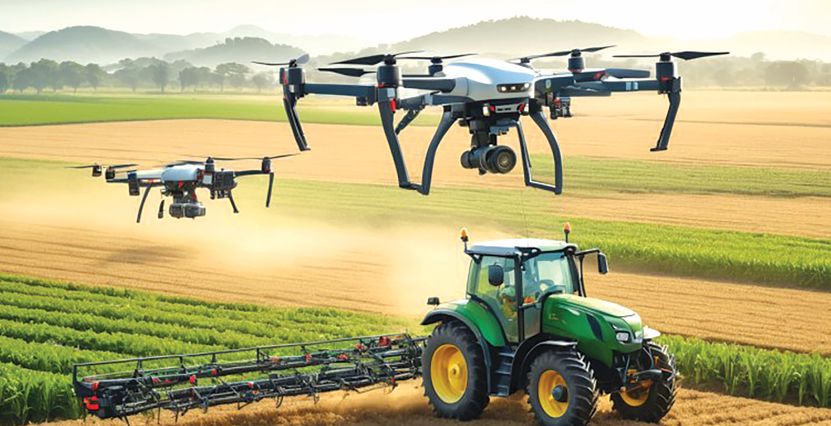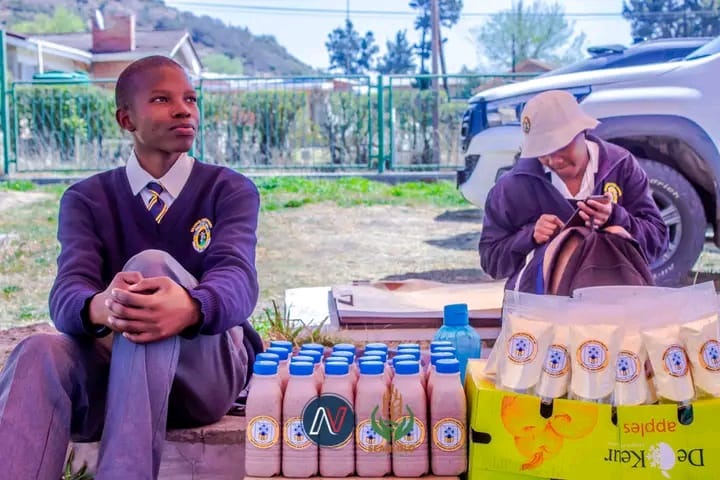Libuseng Molato
In a remarkable leap toward modernising agriculture, two final-year students from the National University of Lesotho, Khotso Phali and Tšepang Nkoe, have developed the Lesotho AI Agriculture Virtual Assistant (LAAVA).
This groundbreaking system, which integrates artificial intelligence (AI) into crop farming, aims to revolutionise the country’s agricultural sector by enhancing productivity, improving sustainability, and addressing food insecurity.
Driving Innovation with AI
During an interview, Phali and Nkoe discussed the inspiration behind their innovation, pointing out the persistent food insecurity in Southern Africa despite the abundance of fertile land.
“We were deeply concerned that many Southern African countries, including Lesotho, still struggle with food security despite having the natural resources to combat it,” explained Nkoe.
They highlighted the escalating prices of staple foods such as maize meal and beans as further motivation to create a system that could alleviate some of the challenges farmers face.
“We realised that by incorporating technology and agricultural intelligence into farming practices, we could help farmers make better decisions, reduce crop damage, and improve their harvests,” Nkoe added.
LAAVA: A Comprehensive Farming Solution
LAAVA is designed as an all-in-one assistant for farmers, offering features that address various aspects of the farming cycle, from soil analysis to market integration.
Phali and Nkoe emphasised that the system is specifically tailored for Basotho farmers, with features aimed at promoting collaboration, education, and practical, data-driven decision-making.
“LAAVA is rich with functionalities that support farmers at every stage of crop production. It’s more than just a tool—it’s a platform that empowers farmers to connect, learn, and grow.”
Key Features of LAAVA
Social Integration and Community Support
LAAVA’s social integration feature allows farmers to interact with one another, much like on social media. Farmers can share posts, images, and updates about their crop production, offering each other inspiration and advice. The system also integrates with WhatsApp, sending notifications to keep farmers connected and informed.
“One of the things we wanted to ensure is that farmers have a platform where they can learn from each other. The integration with WhatsApp allows them to stay updated with notifications about their crops and get quick tips from other users,” Nkoe said.
Language Accessibility
Understanding the importance of accessibility, Phali and Nkoe designed LAAVA with language in mind.
“The system is being trained to understand and communicate in Sesotho,” Phali explained stressing that Basotho farmers, regardless of their educational background, can easily use the system in their native language, making it more accessible and practical for everyday use.
Real-Time Monitoring Through Sensors
One of LAAVA’s most impressive features is its use of sensors to monitor soil conditions.
“Sensors placed in the fields gather critical data on soil humidity, fertility, and temperature, which is then sent to the system. Farmers can access this data through their phones, allowing them to monitor and adjust their farming practices in real time.
“LAAVA is already trained to identify and classify different soil types commonly found in Lesotho, such as alluvial soil, black soil, clay, and red soil,” Phali elaborated. This ensures that farmers can receive tailored advice based on the specific conditions of their land.
Disease Prediction and Management
Phali and Nkoe have equipped LAAVA with AI-driven disease prediction capabilities, allowing farmers to upload images of their crops and receive diagnoses on potential diseases.
“For example, LAAVA can predict common diseases in tomatoes and offer remedies for issues like bacterial spots, early blight, and late blight,” explained the developers.
This feature helps farmers catch diseases early, preventing widespread crop damage and ensuring better harvests.
“Over time, the AI system continues to learn and improve its diagnostic accuracy, providing increasingly effective solutions to farmers,” they said.
Data Analytics and Dashboards
“Farmers using LAAVA have access to a comprehensive dashboard that displays real-time data collected from sensors in the fields. This feature helps farmers manage critical factors such as soil moisture, ensuring they do not overwater their crops. LAAVA also provides detailed data management and report analytics, which are crucial for agribusinesses to track their progress and optimise productivity,” Nkoe explained.
“With LAAVA, farmers can see what’s happening on their farm at any given time. It allows them to make informed decisions based on real data, which is key to improving crop yields.”
Community Forum for Farmer Collaboration
LAAVA’s community forum is another unique feature designed to foster collaboration and mentorship among farmers. Expert farmers are marked with green badges, while new or less experienced farmers have red badges. This system encourages experienced farmers to guide and support those who are just starting out, creating a culture of learning and growth within the farming community.
“Farming is not just about working the land—it’s also about learning and sharing knowledge,” Phali emphasised, pointing out that the community forum makes it easy for farmers to connect, ask questions, and get advice from experts.
Market Price Integration
Recognising the importance of market access, LAAVA provides real-time updates on crop prices. The developers are currently in talks with the Ministry of Agriculture’s marketing department to ensure that the pricing data is accurate and up to date.
“This feature will enable farmers to make better decisions about when and where to sell their produce, maximizing their profits.”
The Road Ahead: Future Plans for LAAVA
Phali and Nkoe have ambitious plans for the future of LAAVA. They are actively working to collaborate with laboratories and soil scientists to enhance the system’s capabilities further.
“We want to gather soil samples from different regions to improve the accuracy of our models. By refining the system, we can offer farmers even more precise and useful insights about their crops,” they asserted.
In addition to refining the technical aspects of LAAVA, the developers plan to expand its reach by conducting workshops and training sessions for farmers across Lesotho. They believe that educating farmers about the benefits of AI and technology in agriculture is key to ensuring widespread adoption and success.
“We see LAAVA as a game-changer for Basotho farmers,” said Nkoe. “We encourage everyone to explore the system and see how it can benefit their farms. It’s a tool that’s designed to help, and we believe it will make a big difference.”
A Brighter Future for Lesotho’s Agriculture
The introduction of LAAVA marks a significant step forward in Lesotho’s efforts to modernise its agricultural sector. By integrating artificial intelligence, real-time data analytics, and community-driven support, LAAVA is poised to empower farmers across the country, boost productivity, and contribute to food security.
“With LAAVA, we are not just addressing immediate challenges in farming. We are building a foundation for a more sustainable and resilient agricultural future in Lesotho,” Phali concluded.
As food security becomes an increasingly urgent global concern, innovations like LAAVA offer hope for countries like Lesotho, where agriculture plays a critical role in the economy and the well-being of its citizens. By harnessing the power of technology, Phali and Nkoe are helping to pave the way for a brighter, more sustainable future for Basotho farmers.
Summary
- During an interview, Phali and Nkoe discussed the inspiration behind their innovation, pointing out the persistent food insecurity in Southern Africa despite the abundance of fertile land.
- They highlighted the escalating prices of staple foods such as maize meal and beans as further motivation to create a system that could alleviate some of the challenges farmers face.
- “The system is being trained to understand and communicate in Sesotho,” Phali explained stressing that Basotho farmers, regardless of their educational background, can easily use the system in their native language, making it more accessible and practical for everyday use.

Your Trusted Source for News and Insights in Lesotho!
At Newsday Media, we are passionate about delivering accurate, timely, and engaging news and multimedia content to our diverse audience. Founded with the vision of revolutionizing the media landscape in Lesotho, we have grown into a leading hybrid media company that blends traditional journalism with innovative digital platforms.









